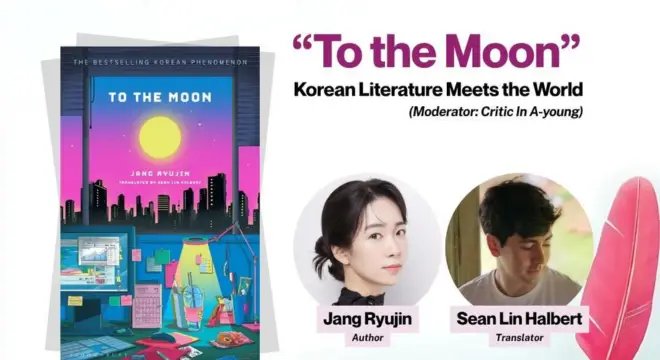|
Getting your Trinity Audio player ready...
|
Korean literature is slowly but surely making its mark on the global stage — and this November, it’s about to shine even brighter! The Korea Times is excited to feature a book talk with Korean author Jang Ryu-jin and her English translator Sean Lin Halbert. The program is entitled “To the Moon: Korean Literature Meets the World,” and it will be held on November 4, 2025, at Kyobo Building in Gwanghwamun, Seoul as part of the 56th Modern Korean Literature Translation Award ceremony.
A Celebration of Stories that Cross Boundaries
This event is more than a book talk; it is a celebration of storytelling alongside the art of translation. Jang and Halbert will talk about their popular novel To the Moon and what it means to be a writer from Korea sharing their work with readers from another country and culture.
Literary reviewer In A-young will facilitate the conversation, framing the discussion of creativity, literary nuance, and ultimately, the nuanced craft of translating stories for an international audience.
Here is the schedule:
- 6:00 PM: Award reception
- 7:00 PM: Book talk
Entry is free and readers can sign up by scanning the QR code provided by The Korea Times. Everyone — writers, translators, students, and book lovers — is welcome to experience the conversation between an author and her translator — two creative minds collaborating to break the language and cultural barriers together.
From Seoul to the World: Jang Ryu-jin’s Journey
Jang Ryu-jin has earned a reputation as one of Korea’s most relatable and insightful storytellers. To the Moon explores themes of youth, ambition, and emotional connection, all set against the rhythm of life in Seoul.
Originally written in Korean, the book has now been translated into English, Japanese, Chinese, Thai, Turkish, Spanish, and German, each translation bringing Korean experiences of everyday life and cultural contexts to readers across the globe – a comparative strength of jang’s stories.
Jang’s stories are a blend of light-heartedness, verosimilitude, and sorrowful compatibility of age. The characters relate as fellow human beings, the places feel familiar to places they have personally experienced, and the universality of situations, especially the everyday ordinary conflicts of confusion, relating to others, still making everyday life hum, becomes a salient portrayal of our world.
It is this blend of humour, triviality, and absolute relatability that keeps jang’s work popular both nationally and internationally.
Sean Lin Halbert — A Bridge Between Languages
For translator Sean Lin Halbert, working on To the Moon is not just about putting words into English — it’s a creative collaboration. Halbert started his translation career after winning the Modern Korean Literature Translation Award in 2018 and has since become one of the most respected translators of Korean fiction.
His previous translations include:
- The Cabinet (2021) by Kim Un-su
- Counterattacks at Thirty (2025) by Sohn Won-pyung
- The Black Orb (2025) by Ewhan Kim
In an interview, Halbert explained the tricky balance between literal translation and cultural meaning. A small scene — like choosing between Starbucks and Coffee Bean, or brushing teeth after lunch — might seem ordinary, but it carries cultural context. If you don’t understand these small details, the essence of the story can be lost.
Translation, Halbert emphasizes, is about more than words. It’s about capturing how people live, think, and feel. Through his work, global readers can experience the emotional texture of Korean storytelling as it was meant to be felt.

The Legacy of the Modern Korean Literature Translation Award
Now in its 56th year, the Modern Korean Literature Translation Award is among the most esteemed awards for translators in Korea. Over the decades, the award has recognized and supported talented translators who deliver Korean literature to outside audiences.
The award recognizes not only linguistic prowess, but cultural empathy — the understanding of how to translate the soul of a Korean text into a language ranging from Arabic to English, without losing its essence. For translators like Halbert, the award is a platform and promise: to translate and share Korean stories to audiences outside Korea, the award is a promise to maintain the integrity of the original work.
Why Translation Matters
As global fascination with K-dramas, K-pop, and Korean film increases, literary translation serves a vital purpose in familiarizing readers with Korea in ways that extend beyond pop culture. Specifically, books like To the Moon allow readers to feel the emotions, laugh along with characters, and experience some aspects of Korean life and experience, in ways only literature offers.
This Korea Times book talk is a reminder that literature does not exist only in its original language; it exists also through the language, from the passion and personality, of those who write it and the translators through whom it traverses cultures. Without translators, many of the world’s stories would remain under-cover; with translators, the world is a treasure of shared literature.
Looking Ahead
The November 4 event will be more than just an ordinary Q&A. Jang Ryu-jin and Sean Lin Halbert will provide an inside look into how they work together, including how they manage tone, humor, and even nitty-gritty minor details between languages.
For writers and translators, this is a unique chance to see how creative chemistry transcends languages. The conversation will also highlight some of the conversations within the future of Korean literature and how it will continue to be presented and consumed internationally, while also reinforcing why honest storytelling matters at the end of the day.
A Bridge of Words
In the end, the collaboration of Jang Ryu-jin and Sean Lin Halbert is much more than a singular book. It is about connection — between the writer and translator, between Korea and the world, between readers across land and sea.
To the Moon is not simply a book, but rather a sensation. It proves that a story is a story, regardless of how it is translated or where it is read — whether Seoul, London, or New York.


